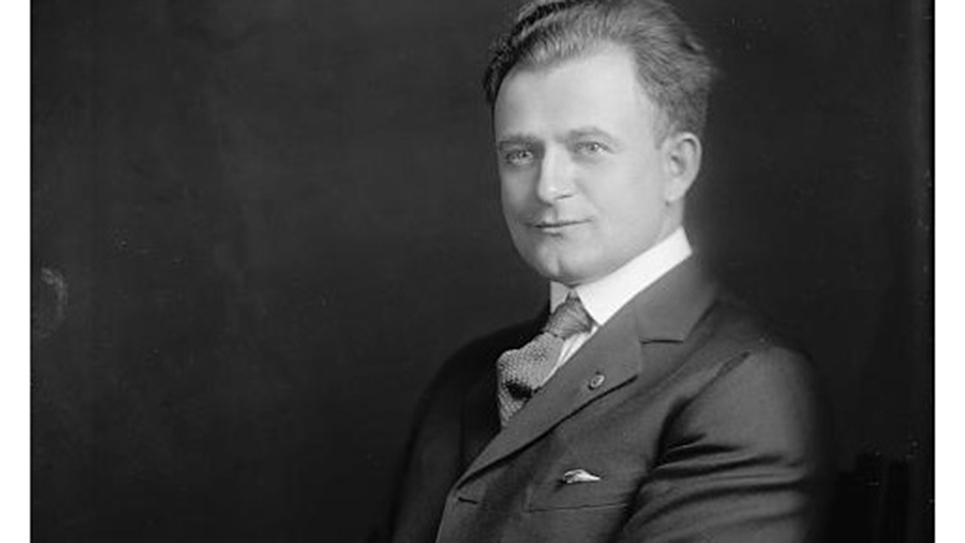Buncombe Bob: Sen. Robert Reynolds of North Carolina
Robert Rice Reynolds was the most unlikely of United States senators. Oft-married and openly for the repeal of prohibition in a dry state, this near perennial candidate had lost every election he had contested save for the one Senate seat. Successful candidates are a product of their own times and that was certainly true of Bob Reynolds. Had he not first sought election to the United States Senate during the early years of the Great Depression, Reynolds probably wouldn’t have been elected. Fate also provided the perfect foil for Reynolds in the Democratic primary. Senator Cameron Morrison was a distinguished former governor who had started North Carolina’s “good roads” program and made them the finest hard-surfaced roads in the Southland. Morrison looked the part, possessing a head of white hair and a stately appearance. The former governor had married Sarah Watts, widow of George Washington Watts, who had been the business partner of the Duke brothers and together they had built the American Tobacco Company.
The senatorial campaign of Robert Reynolds in 1932 became one of the more famous for the North Carolinian’s brilliant, albeit ruthless, use of class warfare, ridicule and sheer demagoguery. Bob Reynolds portrayed Cameron Morrison as a chauffeur-driven millionaire who daily consumed the entire breakfast, luncheon and dinner menu of Washington’s elegant Mayflower Hotel. Reynolds regaled rural audiences, carrying a red carper under one arm so that he could unroll it with a flourish to imitate Morrison strutting down its length after the senator’s “footman” had unfurled it so that Morrison’s feet would not tread upon the vulgar concrete of mere mortals. Most famously of all, Reynolds declared that good old hen eggs were not good enough for Cameron Morrison, who preferred caviar. Reynolds asked his audiences if they knew what caviar was and explained it was nothing but fish eggs from “Red Rooshia.”
Cameron Morrison was hit with the impact of a high-speed train; he hardly knew what hit him. Bob Reynolds, to the surprise of nearly everyone, buried Senator Morrison on Election Day beneath an avalanche of votes. North Carolina has never seen before or since anything like Bob Reynolds and his 1932 campaign for the Senate. Historian Elmer L. Puryear once said Bob Reynolds had literally laughed his opponent out of office.
The year before Bob Reynolds left the U.S. Senate, TIME magazine described the North Carolina senator: “’Buncombe Bob’ who is 59 and looks 45, has been something to see: his blond hair, worn actor’s length, combed casually over the back of a Barrymore-ish collar, his gay bow tie propped at an insouciant angle, striding merrily and importantly through the Senate at the noontime opening of a session. He gives a backslap here, a glad hand there, pausing to drop a witticism at this Senator’s desk, an encouraging word of counsel at another’s, to confer now gravely, now casually—dynamic, carefree, yet occasionally sober under the solemn responsibilities of statesmanship. Here, it seems from the gallery, is the very picture of a wise and charming legislator, beloved of his colleagues, happily resuming his burden.” The correspondent for TIME noted, “The performance lasts some 15 minutes, perhaps half an hour if the noontime gallery is crowded…” Reynolds would ask for unanimous consent to place an editorial from a North Carolina newspaper into the Congressional Record, causing the correspondent to muse, “No Senator in a generation has been able to put such dramatic flair into such routine.” Dryly, the TIME correspondent wrote, “Then, his presence elsewhere obviously demanded by the pressure of world events, the Senator hastens out of the chamber, leaving his dull-appearing colleagues to carry on with whatever small chores remain. He is usually seen no more that day, to the concern of the galleries.”
When Bob Reynolds died, the Winston-Salem Journal editorialized that the former senator “was one of those people who give substance to the notion that if a man is colorful enough and runs for public office often enough, he’s sure to get elected.”
Like his contemporary Huey Long, Robert Reynolds was more showman than a politician. Reynolds was also unusual for his views on foreign policy, at least in the South, which was a bedrock of support for internationalism as the Second World War approached. Senator Reynolds embraced the isolationism prevalent throughout much of the American Midwest. Throughout his first term in the Senate, Reynolds faithfully supported Franklin D. Roosevelt and the New Deal. Bob Reynolds was not so callous as to ignore the hardships faced by most of the people he represented and he genuinely believed the programs pushed by President Roosevelt would help to alleviate much of the suffering caused by the Depression and its deprivations.
With war clouds gathering over Europe as well as the Far East due to the imperialistic designs of the Japanese Empire, Reynolds became one of the more strident voices of isolationism inside the Senate. When the Roosevelt Administration and Secretary of State Cordell Hull attempted to revise the restrictive Neutrality Act, every Southern senator voted for revision except for two; Bob Reynolds and Louisiana’s John Overton.
Senator Reynolds had never been a favorite of the North Carolina political establishment. Every official and politician of any note had backed Senator Morrison in 1932. When Reynolds ran for reelection in 1938, he was challenged inside the Democratic primary by Congressman Franklin W. Hancock Jr. Reynolds won easily, garnering better than 60% of the vote. Senator Reynolds won by an even larger margin in the general election against GOP nominee, former Congressman Charles A. Jonas.
Now expensively attired, Reynolds was affable, courtly and expansive and cultivated a reputation as something of a playboy. While the news media of the time enjoyed Bob Reynolds and his antics, few journalists took the North Carolina senator seriously. For some, Bob Reynolds was a sorry joke. Reynolds allowed himself to be photographed kissing movie goddess Jean Harlow in the Capitol and unabashedly earned a hefty fee for endorsing Lucky Strike cigarettes. Even with his penchant for the kind of publicity that would have ended the political career of another, Reynolds had won reelection due to his support for the New Deal and his attention to the folks back home.
The senator’s second term saw the issues change from less domestic challenges to foreign policy with a world troubled and on the brink of war. Senator Reynolds, upset because of patronage squabbles with the White House and his disagreement with FDR over foreign affairs, broke with the New Deal.
The joke turned sour when Reynolds got a seat on the Senate’s prestigious Foreign Relations Committee. TIME magazine reported South Carolina’s political magician James F. Byrnes arranged for Reynolds to get the coveted seat on Foreign Relations by bartering with the North Carolinian to vote against a higher appropriation for the Works Progress Administration. Probably no member of the United States Senate enjoyed publicity more than Bob Reynolds and one must wonder if he especially cared whether it was good or bad. Increasingly, the attention Reynolds received from the news media was negative. Reynolds focused on the problem of immigration. It was frequently a hallmark of Bob Reynolds’ career. The senator took a junket to Germany and advised his colleagues the United States should, as noted by TIME, “stop hating the Nazis.” Reynolds’s pronouncements became more suspect as to being antisemitic. The news magazine reported, “No living Senator can draw a more appalling picture of the Yellow, Black and Brown Perils.” Bob Reynolds also chaired the Senate’s Military Affairs Committee through most of World War II.
Reynolds certainly commanded intense national attention for his fifth and final marriage when the 57-year-old senator married 19-year-old Evalyn Washington McLean. Miss McLean was an heiress, the daughter of Edward B. McLean, former owner of the Washington Post and Evalyn Walsh McLean, owner of the fabulous Hope Diamond. The couple had a daughter, Mamie. The couple seemed happy, but less than six years later Evie McLean Reynolds was discovered dead by her mother. The 24-year-old heiress was dead from what was reported to be an “accidental” overdose of sleeping pills, leaving Bob Reynolds to raise their young daughter. Evie’s mother died a year later and Evalyn Walsh McLean’s estate, “Friendship,” was left to the use of Robert Reynolds. According to Mrs. McLean’s will, if the house were to be sold, the proceeds were to go to the former senator.
By 1943, Senator Bob Reynolds’ isolationism and outlandish behavior had comprised his once formidable popularity in the Tarheel State. Clyde Hoey, a former congressman and governor, was gearing up to run against the senator in the 1944 Democratic primary. Hoey was one of the most popular political figures in the state. Reynolds was not so far gone that he miscalculated his own appeal having seriously diminished; the senator also was fully cognizant of how strong a challenger Hoey would be in a primary. Reynolds finally announced he would retire from the U.S. Senate at the conclusion of his term. Hoey faced Congressman Cameron Morrison, the same Morrison who had lost his Senate seat to Bob Reynolds twelve years earlier. Clyde Hoey won easily and served until his own death.
After leaving the Senate, Bob Reynolds opened a law practice in the Capitol while living in Maryland with his wife and daughter. Following the death of Evie McLean Reynolds, the former senator moved back home to Asheville, North Carolina. From atop his home on Reynolds Mountain, “Buncombe Bob” supervised the raising of his daughter while maintaining the appearance of practicing law.
By 1950, Bob Reynolds ached for the limelight of public office once again. Bored in retirement, the former senator thought he saw a political opportunity with the death of Senator Melville Broughton. Governor W. Kerr Scott appointed Frank Porter Graham, the highly liberal president of the University of North Carolina, to fill the vacancy caused by Broughton’s death. Reynolds, after six years out of the Senate, thought the time was ripe for him to make a political comeback. Graham was considered by much of North Carolina’s political establishment to be too liberal to merit a seat in the Senate. Willis Smith, a highly conservative attorney, entered the Democratic primary; his campaign was run by a young radio executive named Jesse Helms. Bob Reynolds’ time had come and gone. The former senator was never a real factor in the election. The only role left for Bob Reynolds left to play was that of spoiler. At some point in the primary campaign, Reynolds realized his effort wasn’t going anywhere. The former senator ceased to campaign actively. Reynolds failed to win 10% of the ballots cast inside the Democratic primary and ran a poor third in a field of four candidates. What Bob Reynolds did manage to accomplish was keeping Senator Graham from winning the necessary majority to avoid a run-off election. Willis Smith called for a second primary and beat Graham decisively.
The door to return to politics closed firmly shut by the people of North Carolina, the former senator returned to his home atop Reynolds Mountain. For the next thirteen years, Bob Reynolds dabbled in the law and lived in semi-retirement. Stricken with cancer, Bob Reynolds died on February 13, 1963.
The former senator’s passing drew the notice of the news media once again. The Winston-Salem Journal wrote following the “wild political binge” that was Bob Reynolds’ twelve years in the U.S. Senate: “politician, lawyer, cowboy, actor, ranch operator and soldier of fortune” and that the people of North Carolina had finally “come back to earth.” The newspaper archly noted, “It was well that they did.”
The Charlotte News noted that Senator Reynolds had done many a personal kindness through the years but had, like “so many good politicians,” ruined his career by having “wrapped his light in a bumpkin’s cloth.” The sometimes-prescient predictions of Bob Reynolds were oftentimes ignored the newspaper sadly concluded, because too many dismissed him as a clown.
© 2024 Ray Hill







